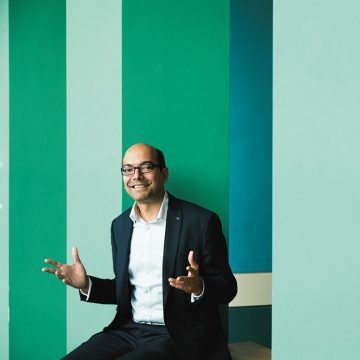This idea must die: “The University is an ivory tower”
In fact, says innovation expert Diarmuid O’Brien, ideas created at Cambridge create impact on a global scale.
It is ironic that the idea that “the University is an ivory tower” has gained any traction when the very opposite is the case. Perhaps it’s because many of the people in positions of influence today had their university experience some 20 to 30 years ago – and since then a radical transformation has taken place. Universities today operate as the most porous of entities and are the most collaborative of any organisation I can think of. Which makes sense because they can only thrive when they are relevant.
Indeed, few other institutions have such a wide range of stakeholders, from government agencies and public bodies to the charitable and corporate world. At Cambridge, our mission is to contribute to society, essentially to create impact from our research and education. Our commitment to delivering social and economic impact is part of the unwritten social contract with the bodies that fund our research.
It is not enough to create knowledge that exists only within the University, we need to build on the mechanisms to transfer that knowledge out. This isn’t new of course – many homes in the UK will already be benefiting from Cambridge research. It may be the child born as a result of IVF, it could be the battery in your car, or the webcam or the voice-controlled artificial intelligent assistant in your kitchen. Many of the leading medicinal drugs used globally are a result of the Nobel Prize-winning research on human monoclonal antibodies.
What is new is the University’s commitment to the transitional journey, to translating research into commercial development at scale. And industry is looking to us to do just that. Unshackled by quarterly profit figures and shareholder expectations, universities are better positioned to translate ideas into reality. To achieve that, we have become skilled at developing spinouts through our network of angel investors, venture capitalists and entrepreneurs.

An exemplar company is Nyobolt, co-founded by Professor Dame Clare Grey and Dr Sai Shivareddy, to commercialise their novel, ultra-high power battery technology. Nyobolt is delivering on a vision of better batteries – that charge rapidly and are recyclable – and closed a £50m funding round that will allow the company to start manufacturing at scale. It will also enable Nyobolt’s first materials manufacturing plant in the UK.
Another spin-out company, Cambridge GaN Devices, is also delivering on this dual mission of transformative technology that can impact the environment. Data centres now account for two per cent of the world’s energy usage. They are developing a highly efficient gallium nitride (GaN)-based integrated circuit for use in data centre server power supplies that has the potential to save more than five megatons of CO2 emissions each year over the next decade.
Last year alone, Cambridge-associated companies turned over £8.5bn, generating investment of more than £2bn and employing 25,000 people. Much of this activity has no direct economic benefit to the University; instead, ideas created at Cambridge create impact on a global scale.
With 141 countries now represented here, the international student and research base feeds off collaborative projects with other academic institutions globally. The recent experience of the pandemic showed the world the vital roles universities can play, through the rapid sequencing of DNA and the development of vaccines.
Indeed, universities are expected to contribute to the big challenges facing us: climate change; sustainability; global health. To do so successfully, they must continue to engage in provocative thinking, yet remain in close partnership with society.
In many ways, the College environment at Cambridge provides the example. Colleges are a melting pot of people from different backgrounds and cultures, studying and working on a huge range of topics from both science and the humanities. The idea that you can live and work in isolation from what impact you have on the real world simply does not happen in a college world, where everyone exchanges ideas.
Yet few people realise how many of those ideas end up having a practical impact on their lives, whether it be through the technological advances or the cultural dividend. They remain largely oblivious to the collaborative nature of the work we do here. That can be a challenge when seeking financing, and as an institution we need to work harder at getting our story across.
Cambridge University is proud to strive for excellence by attracting the most capable students, but it is not elitist. Excellence is empowering, not distancing. Far from pulling up the drawbridge on its ivory tower, the University is the very opposite, committed to impacting on society globally and enhancing people’s lives.
Dr Diarmuid O’Brien is Chief Executive of Cambridge Enterprise.







